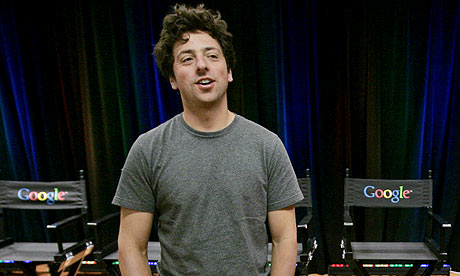
Google co-founder Sergey Brin has hit out at critics who derailed the company's $125m deal with American publishers to give it the right to digitise millions of books.
The proposal, which promised to create a huge library of material available through Google's website, is currently being renegotiated after the judge in charge of the case received a wide range of objections to the terms of the deal.
In a column published in the New York Times, Brin - who founded the internet giant with Larry Page in 1998 - hit out at those objectors, called many of their accusations "myths" while dismissing other concerns as fantasy.
"This agreement aims to make millions of out-of-print but in-copyright books available either for a fee or for free with ad support, with the majority of the revenue flowing back to the rights holders, be they authors or publishers," he wrote.
"Nothing in this agreement precludes any other company or organisation from pursuing their own similar effort. The agreement limits consumer choice in out-of-print books about as much as it limits consumer choice in unicorns."
Under the original terms of the agreement - which emerged as an out-of-court settlement to a case brought by American publishers against Google after it digitised in-copyright books - the internet company agreed to pay for the right to make millions of texts available online and share any proceeds with rights holders.
First announced almost a year ago, the deal came in for widespread criticism from a variety of organisations; including Microsoft and Amazon - which appeared to oppose the deal on commercial terms; as well as others who feared that Google's agreement would prove an obstacle to the reform of US copyright law.
In September, New York district judge Denny Chin effectively postponed the settlement, saying that it "raises significant issues" and that "fair concerns have been raised".
He did not rule out approving a reworked version of the agreement, however, adding that there would be substantial public value if an appropriate deal could be hammered out.
Brin's comments come a day after he came in for fierce criticism from Brewster Kahle, the founder of the non-profit Internet Archive, which has been working to secure a change in copyright law to help digitisation projects. In particular, the archive has been working to clarify the status of so-called "orphan" works - books whose copyright holder remains unknown - by pushing new legislation through the US Congress.
Under Google's proposal, the Californian internet company would have gained the exclusive right to sell advertising or access to orphan works - something Kahle felt was inappropriate.
"Many of us are objecting because we have been working together for years on the mass scanning of out-of-print books – and have worked to get books online for far longer than Google – and Google's 'settlement' could hurt our efforts," he wrote in a blog post on Wednesday. "A major part of our efforts have concentrated on changing the law so everyone would benefit."
"There is an alternative, and they know it — orphan works legislation — that up until the last session of Congress had been working its way through the house and senate. It was not perfect, but was getting close to what we need. Best yet, it passed one house — at least until Google effectively sideswiped the process with their settlement proposal."
In his editorial, Brin admitted that Google would have exclusive rights over such material, at least in the short term - but then suggested that Google's deal would actually help attempts to force through a legislative change.
"While new projects will not immediately have the same rights to orphan works, the agreement will be a beacon of compromise in case of a similar lawsuit, and it will serve as a precedent for orphan works legislation, which Google has always supported and will continue to support."
Whether Google is able to rescue its deal with publishers will become more clear next month, after Judge Chin this week set a deadline of November 9 for any revisions.

